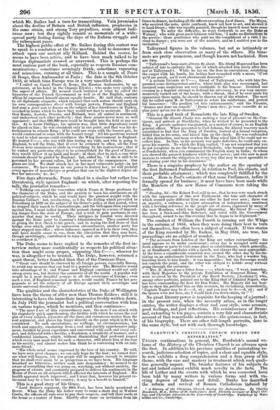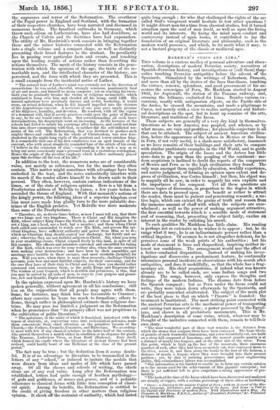HARDWICK'S CHRISTIAN CHURCH DUBIN° THE REFORMATION. * UNLIKE continuations in general,
Mr. Hardwick's second vo- lume of the History of the Christian Church is an advance upon the first. In addition to his previous qualities of painstaking re- search, judicious selection of topics, and a clear and equable style, he now exhibits a deep comprehension and a firm of his theme, with the ease and mastery in treatment which suchquali- ties generally impart. The broader features of his subjects do not and indeed cannot exhibit much novelty in the facts. The life of Luther and the events with which he was connected have been told by many writers in various forms and with va- rying degrees of fulness and detail. Ranke has cleseribet1 the -reform and revival of Roman Catholicism induced by • A History of the Christian Church during the Refornuateu. By Charles Hardtack, ALA., Fellow of St. Catherine's Hall, Divinity Lecturer at Xing's Col- lege. and Christian Advocate in the University of Carnhri4o, rubusbvi uy Mac. Indian and Co., Cambridge.
the exposures and terror of the Reformation. The overthrow of the Papal power in England and Scotland, with the formation
of their respective churches have been narrated and discussed in numerous works. The fanatical outbreaks in Germany, which
threw such odium on Lutheranism, have also had describers, as the Church of Calvin and its doctrines have had expounders.
The utility of Mr. Hardwick's work consists in bringing together these and the minor histories connected with the Reformation into a single volume and a compact shape, as well as distinctly presenting their broad features to the student. Its peculiarity lies in passing over particular facts and events, and touching upon the leading results of actions rather than describing the actions themselves. The merit of the history consists in the pene- tration with which the opinions of the age, the traits of its re-
markable men' and. 'the intellectual character of the history, are perceived, and the force with which they are presented. This is a small example from the incidental notice of Luther.
"The natural bent of Luther's mind was certainly not in the direction of monasticism : he was social, cheerful, strongly sensuous, passionately fond of art and music and himself no mean composer : yet on reaching his twen- tieth year he gradually became the victim of religious melancholy, which continued to hang over him and clouded all his being, until 1608. His mental agitations were peculiarly intense and awful, bordering, it would seem, on actual delirium, when he felt himself impelled into the cloisters of the Augustinian convent. A noviciate of one year gave ample promise of his diligence, humility, and devotion. He resolved, with all the vigour of a dominant will, that if ascetic practices could open the gates of Heaven to any, he for one would enter there. But notwithstanding all such brave determinations, his disquietude went on increasing. As the lectures of the schools had failed to satisfy his yearnings after holiness, and could not draw him into closer communing with God, so neither did the self-inflicted tor- ments of his cell. The Reformation, that was destined to produce such mighty throes and conflicts in the whole of Christendom, was now fore- shadowed in the night-long vigils of the penitent and terror-stricken friar. It is remarkable that one of his first comforters was an aged inmate of the Convent, who with great simplicity reminded him of the article of his creed, I believe in the remission of sins,'—expounding it in such a way as to bring out more consciously man's personal trust in a gratuitous redemption. Hence the origin of the peculiar emphasis which Luther uniformly placed upon this doctrine all the rest of his life."
In addition to the text, the numerous notes are of considerable value, not merely as references, but for the matter they often contain. This matter might sometimes with advantage have been embodied in the text, and the notes undoubtedly interfere with its march if the reader allows himself to be drawn aside to their perusal. They often, however, contain curious indications of the times or of the state of religious opinion. Here is a bit from a Presbyterian address of Melville to James a few years before he ascended the throne of England. With that monarch's notions of the kingly power, the following ideas of a superior kingdom over turn must nave made him gladly turn to the more palatable doc- trines of the English prelates. Yet Melville was more moderate than some of the Presbyterians.
"Therefore, sir' as divers times before, so now I must tell you, that there are two kings and two kingdoms. There is Christ and His kingdom the Kirk, whose subject King James the Sixth is, and of whose kingdom he is not a kink, nor a head, nor a lord, but a member - and them whom Christ bath called and commanded to watch over His lark, and govern His spi- ritual kingdom, have sufficient authority-and power from Him so to do; which no Christian king should control nor discharge, but fortify and as- sist; otherwise they-are not faithful subjects to Christ. Sir, when you were in your swaddling-clouts, Christ reigned freely in this land, in spite of all His enemies. His officers and ministers convened and assembled for ruling of His Kirk, which was ever for your welfare also, when the same enemies were seeking your destruction ; and, have been by their assemblies and meetingssince terrible to these enemies, and most steedable [helpful]. for you. ill you now, when there is more than necessity, challenge Christ's servants, your best and most faithful subjects, for their convening, and for the care they have of their duty to Christ and you when you should rather commend and countenance them, as the godly flings and Emperors did ? The wisdom of your Council, whicii is devilish and pernicious, is this, that you may be served by all sorts of men, to come to your purpose and grand- eur, Jew and Gentile, Papist and Protestant."
In the opinion expressed upon Mr. Hardwick's history we have Spoken generally, without agreement in all his conclusions ; still less on the supposition that all people may agree with them. Some, for instance, may think him too favourable to Cranmer ; others may conceive he leans too much to formalism ; others to Rome, though rather in philosophical estimate than religious doc- trine. He may pass too limited a judgment on the Reformation when he pronounces that "its primary effect was not propitious to the cultivation of polite literature."
"The agitations, in the midst of which it flourished, interfered with the repose of students, or, converting sonic into ecclesiastical polemics, made them concentrate their chief attention on the primitive records of the Church,—the Fathers, Councils, Canonists, and Historians. We according- ly meet with few if any classical scholars in the latter half of the century, who proved themselves a match either in erudition or in elegance for giants like 'Erasmus, Ludovicus Vives, or Jean Bud 4 (Budwus). Italy itself; which formed the cradle where the literature of ancient Greece had been revived, could hardly boast of one Rellenist at the close of the present period."
The fact may be true ; but the deduction from it seems doubt- ful. It is of no advantage to literature to be trammelled in the fetters of any "school," or induced to imitate the models that were drawn from ideas and modes of life which have passed away. Of all the classes and schools of writing, the chiefs alone, are of any real value. Long after the Reformation was established, letters had quite enough of heathen mythology— of gods and goddesses, of muses and graces, and of a pedantic adherence to classical forms with little true conception of classi- cal spirit. Among its benefits, the Reformation is entitled to the credit of giving freedom in other matters than religious opinion. It shook off the restraint of authority, which had lasted
quite long enough ; for who that challenged the rights of the so- called God's vicegerent would hesitate to test other questions 1' It might divert men for a time from classical studies, but it turned attention upon the soul of man itself, as well as upon the living world and its interests. By flying the mind upon conduct and controversy instead of upon books, it contributed to lay the foundation of an original literature and philosophy, such as the modern world possesses, and which, be its merit what it may, is
not a bastard progeny of the classic or medieval ages. •



























 Previous page
Previous page